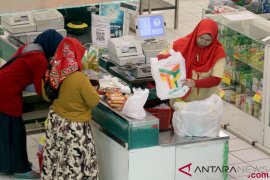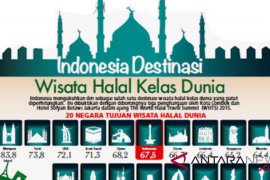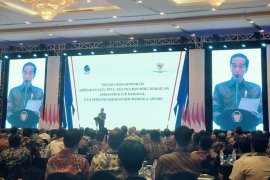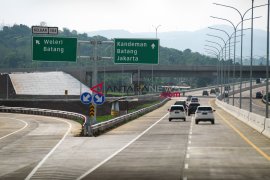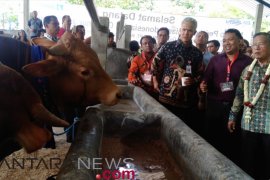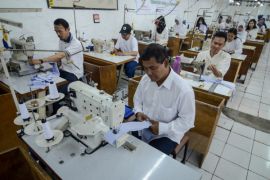Yet the government is determined to free at least four food commodities from value added tax and import duties as an endeavor to keep national food resilience and price stability under control.
"We will make fiscal approaches, such as freeing certain commodities from value added tax and import duties so that they will not fuel price increases. We will possibly make the decision and make it effective next week," Chief Economic Minister Hatta Rajasa said over the weekend.
He said that the step will be taken as an anticipatory step to stabilize food prices and keep them within the financial reaches of the people. The Central Bureau of Statistics (BPS) has noted that inflation in 2010 was 6.96 percent exceeding the target of 5.3 percent.
As the inflation is showing upward trends the government is planning to free from value added taxes and import duties four food commodities, namely rice, wheat, soybean and fodder.
"We will adopt a fiscal policy in the trade sector. We will free wheat, rice, soybean and fodder from import duties. We will do all this for the stability of our basic food prices," the minister said.
However, the government move was criticized by legislator Arif Budimanta, a member of the House Commission XI on financial and national development planning affairs.
"The policy is mistakenly made as in Indonesia imports would not mean prices would go down and goods would be available," Arif said.
He said that the finance minister who the authority to regulate import duties should carefully consider the plan. It should not happen that in taking the decision the minister does not take into account the real condition in society.
"Regulations on import duties are within the domain of the finance minister. The trade minister only provides a proposal. The aim of this is of course to benefit traders," Arif said.
Arif who is also a member of the Indonesian Democratic Party of Struggle (PDIP) faction said that decisions made so far regarding import duties had not yet fully been aimed at reinforcing national economic sovereignty.
He said that the government should not free all food items from import duties only because of the price of chili at home was high.
"The chili industry at home can be said to have been under the control of major foreign players, such as Heinz-ABC and Del Monte. Our instant noodle products have been exported to Africa. So, seen from this point of view, one can see who will benefit from the lifting of the import duties," he said.
In the meantime, besides lifting import duties on certain food commodities, the government will respond to the price hikes by increasing food production at home and continue market operations.
The Agriculture Ministry has set itself the target of increasing food production by 5.0 percent in 2011 as there was a need to offset harvest failures. "This is what we`re planning to formulate, namely a food production increase by 5.0 percent. The key is that what has been planned must not fail to be realized as in 2010 there were no massive harvest failures," Deputy Agriculture Minister Bayu Krisnamurthi said.
He was explaining his ministry`s target on the sidelines of a working meeting between President Susilo Bambang Yudhoyono and all regional leaders at the Jakarta Convention Center.
According to Krisnamurthi, the 5.0 production increase target was based on an instruction from the president that the agricultural sector must increase production, something that had prompted the ministry to formulate the planning.
In line with the policy, Krisnamurthi added, the ministry would hold a meeting with all regional governments from all over Indonesia to prepare for rapid-moving units to respond to small matters but also those which might thwart agricultural production.
President Yudhoyono in the working meeting called for prompt steps to deal with the recent food and energy price hikes. "Our obligation is to stabilize prices, food prices in particular. And we must continue it," he said.
In this regard, chief economic minister Rajasa said that market operations would be continued.
"We would implement the president`s directives about market operations because our stock in the National Logistics Agency (Bulog) is quite large, until the next grand harvest so that the prices would decline," he said.
Hatta said food price hikes were all caused by global food price hike. He said the world`s corn production only rose 1.01 percent while consumption was up 2.5 percent causing reduction in stock by minus 11.7 percent.
Production of wheat and rice meanwhile dropped 5.2 percent and 2.7 percent respectively while consumption jumped 2.5 percent and 3.5 percent making the stock to decline minus 10 percent and 0.52 percent.
"This is the world`s condition. It has happened because of a weather anomaly and rising consumption due to increasing population and the hike in the number of middle-class whose consumption is higher," he said.
To overcome the price hike, the government has secured domestic supply through imports and market operations to help the low income group. The government would intervene in areas needing help.
Therefore, the head of state said there must no longer be a conflict between relevant ministers and regional heads over market operations designed to control food prices.
He said efforts must be made to ensure adequate food stocks and increase food production starting this year. He said efforts must be made to achieve food self-sufficiency.
"Yesterday the agriculture minister reported that rice stocks in 2011 are estimated to reach over 5 million tons. I told him that the amount is not enough to feed the country`s population of 237 million in which the number of middle-class people continues to increase. Therefore, we need to double the figure," he said.
(T.A014/F001/P003)
Reporter: Andi Abdussalam
Editor: Priyambodo RH
Copyright © ANTARA 2011




